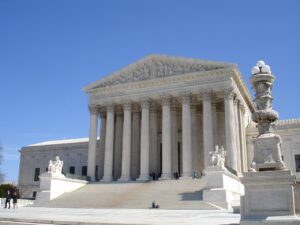
The U.S. Supreme Court (Photo by David Lat).
It is understandable, if not logical, for citizens today to believe religious faith is under attack. When held up to scrutiny, however, the claim falls apart. For one thing, religious liberty is currently on a decade-long winning streak at the Supreme Court. Indeed, thanks entirely to an ever-increasing conservative majority, the Supreme Court has without textual basis and in complete defiance of precedent reimagined the meaning of the First Amendment’s free exercise clause in a way that favors religious exemption from general applicable laws. Of course, 20 or 30 years ago, discrimination against religion on college campuses required a serious legal movement. But that period does not reflect today’s reality, although it serves as a reminder of how citizen-minded organizations can rise to meet a significant challenge to First Amendment guarantees. You would think that as a consequence of such an impressive and resounding winning streak that religious citizens would feel more protected. Instead, the exact opposite has occurred.
In such a religiously diverse country as ours, there are, of course, a lot of explanations for current religious angst. I submit the reason mainstream Christians, however, feel under attack is because both Protestantism and Catholicism are experiencing a rapidly declining membership among the general population. As a consequence of more Americans openly rejecting attendance in Christian churches, nonreligion itself has become more of a boogeyman to Christians. Something not only to fear, but to demonize and hate.

Pursuing The Pro Bono Story: A Conversation With Alicia Aiken
This Pro Bono Week, get inspired to give back with PLI’s Pursuing Justice: The Pro Bono Files, a one-of-a-kind podcast hosted by Alicia Aiken.
Under the previous president’s administration, demonization of the nonreligious population was commonplace and done openly without remorse to citizens whose only perceived failing was they did not believe in religious faiths. The prior administration’s first attorney general had described the nonreligious as a threat to government. At his confirmation hearing just four years ago, he would question whether nonreligious citizens could discern “truth.” Calling into subject the morality of every nonreligious citizen working at the Department of Justice.
The man who would eventually replace that attorney general two years ago took bigotry against the nonreligious a step further and proclaimed that nonbelievers as a collective group were directly responsible for claimed rises in “depression and mental illness,” “suicide,” “senseless violence,” and furthering “a deadly drug epidemic.” This demonization of citizens for their lack of religious belief is not without effect. The nonreligious are one of the most disliked religious minorities in the United States.
Not only is this demonization by cabinet members sickening (imagine if an attorney general nominee said, at their confirmation hearing no less, that they couldn’t say if Catholics or Protestants could discern “truth” because their faith was wrong), it is demonstrably false. As the decline of religion has occurred, over this same period violence and crime have dropped dramatically, and even on a topic many Christians claim is of their upmost concern there is great news: abortion rates are now at record lows. Yet, there is a disturbing insistence by powerful government officials who claim that nonreligion is a national security threat and a threat to the religious way of life.
Nonbelievers, however, are not just facing rhetorical demonization but actual legal oppression. As I have written about before, a federal court has upheld disenfranchising nonbelievers as a collective from giving secular invocations to state legislatures. The court’s theory for banning nonbelievers from addressing their own state legislatures with patriotic messages of universal tolerance and unity was that “only theistic prayer can satisfy all the traditional purposes of legislative prayer.” Again, imagine for one second if a federal judge said that neither Catholics nor Protestants could give invocations because only nonreligious messages could “satisfy all the traditional purposes” of a secular or civil government?

How Innovative Legal Teams Are Turning AI From Promise To Practice
In recent years, AI has moved beyond speculation in the legal industry. What used to be hypothetical is now very real.
Regardless of whether you agree that only religious faiths that have given invocations in the past are capable of giving invocations to state legislatures now or in the future. Or that it is just nonbelievers that can be excluded from offering invocations. This is not a neutral position but a direct (and in my opinion vile) system of government-enforced exclusion and discrimination against an ever-growing population of American citizens. And if we’re talking tradition, traditionally American legislatures represent all citizens, regardless of their religious faith.
In another federal court, nonreligious citizens were banned from performing private wedding ceremonies for nonreligious couples. Yes, you read that right. A federal court upheld a law that bans one-fifth the population in Texas from performing private wedding ceremonies. Solely because the citizens lacked a government-required religious belief to perform a private task. If a nonreligious couple wants a nonreligious celebrant in Texas, the government will only allow them to use the services of a government official, whereas a religious citizen in the same state can have someone from their own community, who reflects their values, and at their exclusive choosing, perform the same (legal) ceremony without any interference from the government.
I will say this until I am blue in the face: there is no form of legal or cultural attack on believers that even remotely compares to the legal disenfranchisement faced by nonbelievers in just these two cases. And I could go on and talk about how the Supreme Court upheld forcible taxation on nonbelievers to subsidize a giant Christian monument.
With such gross imbalance toward favoring religion in the law you would be right to ask how a claim of persecution by government against religion persists? The blunt answer is that people are being deliberately mislead. Take Kennedy v. Bremerton School District for example, a case coming out of Washington state that has been making the religious outrage rounds on platforms like Fox News. To hear the plaintiff tell it, he was fired because he was simply expressing his faith. But the facts of the case tell a much different story. Here are the undisputed facts:
A public high school football coach began to pray in the middle of the field immediately after the football games ended. At first, he prayed alone. When several students asked to join the coach in prayer the coach responded with “[t]his is a free country” and that “[y]ou can do what you want.” Over time, a majority of the team would join the prayer and sometimes the opposing team also joined. At one point, the parent of an atheist student told the principal that his son “felt compelled to participate” in the coach-led prayer even though he didn’t believe in religion because “he felt he wouldn’t get to play as much if he didn’t participate.”
The school, fearing a lawsuit on establishment clause grounds made an attempt to work with the coach to provide a “location within the school building, athletic facility or press box” that could be made available to the coach to practice the religious exercise he and others were joining into, before and after games. The school even said the coach, or any player could pray on the field. Just not right after the game and before the children had been released to the care of their parents. Instead of discussing the matter with the school as requested, the coach chose to go on a media blitz that, in his own words, was to “spread the word of what was going on.” In these media appearances the coach repeatedly portrayed himself as the victim of religious persecution by the school and vowed to continue the prayer despite any school order. The media attention turned the issue into a spectacle and a potentially dangerous one at that. Several school officials testified they suffered repercussions (and fear for their own safety) due to the increased attention and anger being expressed at the way the coach “chose to address the situation.” On at least one occasion the school was unable to properly supervise the students and keep the crowd under control at the game.
After the season ended, and during the school district’s performance review, the school choose not to rehire the coach because he had “failed to follow district policy,” and that “his actions demonstrated a lack of cooperation with administration,” and had “contributed to negative relations between parents, students, community members, coaches and the school district,” while he “failed to supervise student-athletes after games due to his interactions with [the] media and [the] community.”
More than a few things stand out about these facts that conflict with the narrative used by the coach in the media that he was fired because of his faith. The school showed no animus to the coach’s faith for one thing, the school was only objecting to the time and place of the exercise, not the religious practice itself. The school even offered to open up all of its facilities to accommodate the religious expression, at virtually any time other than right after the game before the students had been released to the care of their parents. Moreover, I submit it is completely understandable why the school would be worried about the time and manner of the exercise that has nothing to do with religious animus but to better encourage personal choice and free exercise.
Religious exercise is a personal choice that is better reserved to the decision-making between the parent and child. When led by government officials who students are mandated to follow while under their supervision, it is entirely more problematic than leaving the choice entirely between the student and their parents — parents who are more than capable of deciding whether to allow their children to attend such a planned religious exercise.
The spectacle of stigma is what prevents equitable results in religious liberty cases. Knowing that it is still amazing to watch it work despite the obvious. How anyone can justify the legal argument that the coach in Bremerton is a victim of hostile government animus, while states banning nonreligious wedding celebrants from even being a thing couples can have at their own private ceremonies is just is beyond me. Calling such a system religious “liberty,” is not only mistaken, but pernicious and intentionally deceiving.
 Tyler Broker’s work has been published in the Gonzaga Law Review, the Albany Law Review, and is forthcoming in the University of Memphis Law Review. Feel free to email him or follow him on Twitter to discuss his column.
Tyler Broker’s work has been published in the Gonzaga Law Review, the Albany Law Review, and is forthcoming in the University of Memphis Law Review. Feel free to email him or follow him on Twitter to discuss his column.